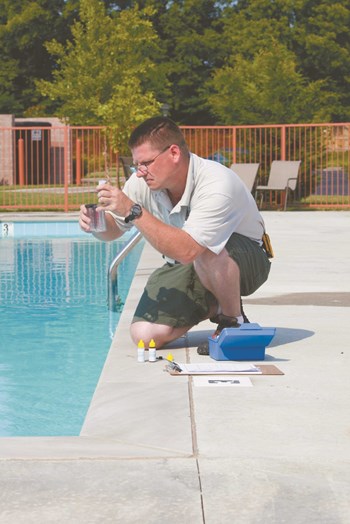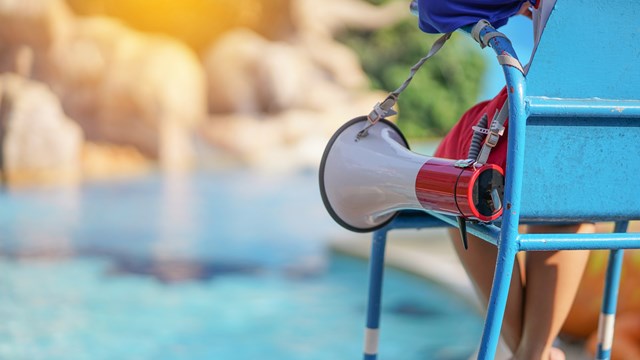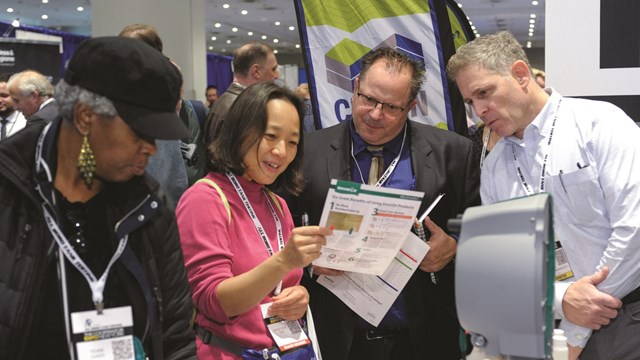
Swimming facilities are one of the most desirable amenities an HOA can have. They're great for socializing, getting exercise, and surviving the summer heat, but there's a lot of maintenance, upkeep, and outright science to keeping even a semi-private pool functioning as a pleasant, much-appreciated amenity. Add in the issues of liability and compliance with health and safety codes, and taking care of your association's pool is serious business that requires a comprehensive plan and conscientious management.
"A pool facility is something that's attractive to most purchasers," says Gary Wilkin of Wilkin Management Group in Mahwah. "It adds something of an expense to [an HOA's] operation, but I think that's offset by the fact that it's available to the residents who live there, and it's a great place for them to socialize in a nice environment."
A Year-Round Job
It'd be great if all your pool needed were some chlorine in the summer and a pool cover in the winter, but it's more complicated than that. For a property manager and board, keeping a pool in shape is a year-round job.
Most management professionals have a checklist of tasks to complete before summer arrives—topped by items like lining up an outside pool management service to take care of the pool. By early May, communities should also be on track to get the pool ready for swimming season—starting with the hiring of a lifeguard and a thorough inspection of the facilities. “You need to start as early as you can,” says Trevor Sherwood, owner of Pool Operation Management in Brick, New Jersey, who leads courses throughout the Northeast for Certified Pool Operators (CPOs). Swimming pools can be beset by an array of common problems—everything from an imbalance of chlorine to a broken pipe, from cloudiness in the water to a motor that isn't grounded correctly, from a toddler urinating in the pool to debris getting into cracks in the wall. And even if everything is OK, you still may have a steady stream of people going in and out of the pool, making cleanliness imperative.
The pre-season inspection and preparation will include looking for tiles loosened by winter freeze/thaw cycles, and acid washing the pool walls. A brief “pool opening procedure” document that can be found online at www.pooloperationmanagement.com offers a starting point for communities to develop their own season-opening system. “And before the pool opens, I always make sure I have everything I need,” Sherwood adds, right down to the smallest of items. “You may think you have everything from last season, but stuff breaks or gets used or even stolen. You don’t want to find out when you need Band-Aids that the [first aid] box is empty.”
That's why pool operators or managers in the state of New Jersey must be certified as CPOs, although they can delegate some of the daily maintenance tasks to properly trained lifeguards or superintendents. To be certified, CPOs must complete 16 hours of instruction and pass a written examination provided under the auspices of the non-profit National Swimming Pool Foundation (NSPF) based in Merrick, New York. Training courses are given in various locations throughout New Jersey and the material includes topics such as pool and spa chemistry, testing, treatment, filtration, maintenance, government regulations and requirements, safety and related issues. Because there are so many variables to control, state health inspectors must give pools an official check-up before the start of each season. Local municipalities can do random inspections of HOA pools as well. In order for a pool to pass muster with the inspectors, property managers and their pool staff must uphold certain standards at all times, says Lawrence Waxenberg of Preferred Pool Management in Teaneck.
First and foremost, a pool manager is concerned with safety—and that involves many considerations, from the quality and clarity of the water in the pool to the condition of the tiles and concrete deck. To maintain water quality, keeping the right chemical balance is essential. The primary chemical is chlorine, which is important because it works to kill bacteria. "If there is no chlorine," says Waxenberg, "bacteria will grow, and the pool will become cloudy and unswimmable. The wrong chlorine balance can also result in corrosion and ruin the pipes."
Maintaining the non-microbial cleanliness of the water is extremely important. This entails "skimming" the surface of the water for leaves and other debris with a skimming net; running an underwater vacuum over the bottom and sides of the pool; and brush-cleaning plaster or epoxy tiles to remove debris that may accumulate in the cracks, says Stuart Roaker of The Pool Therapist in Staten Island. Once again, lifeguards or superintendents can be trained to do most of this. Backwashing—or reversing the flow of water in the pool's circulation system to clean out the filters—is usually done at the end of the day when people aren't in the pool. At some HOAs, pool maintenance doesn't stop at night—special mechanical devices able to crawl the bottom and walls of the pool are used to remove debris from the pool surfaces after-hours.
In addition to minimizing bacteria and debris, pool managers also have to make sure the pH of the water is correct. Maintaining the right chemical balance in public pools is so important that it's required by law in New Jersey. The water in a pool must be tested for chlorine and pH every two hours. "You can't always have a professional do it, so you can train a lifeguard to do it," says Waxenberg. "His or her supervisor is a CPO."
Know the Code
Along with chemical monitoring, cleaning, and mechanical checkups, the CPO and their staff are also responsible for making sure the pool area is kept up to code. The pool manager must know not only the rules and regulations for community health, but also related liability and insurance issues. And, as anyone who's ever managed an HOA or condo or sat on a board knows, codes often change. Maintaining traps and motors is also a key part of maintaining a pool's safety and swimmability.
For example, in December of 2007, the Virginia Graeme Baker Act went into effect, requiring that all public pools—including those in apartment complexes and HOAs—install drain covers and shut-off valves compliant with anti-entrapment safety standards established by the Consumer Products Safety Commission (CPSC).Compliance was required by December 2008, but a July 2009 study by NBC News found that half or more of those public pools they surveyed had yet to comply.
According to Bob Blanda, owner of Mill Bergen Pool Center in Brooklyn, New York and a director of the Northeast Pool and Spa Association (NESPA) chapter which covers the NY-NJ metro area, it’s possible for a swimmer’s hair to become entangled in certain types of drains, or for a victim to be trapped underwater and even eviscerated by extreme drain suction. The new, code-compliant drain covers reduce or eliminate this danger, and mandatory shut-off valves allow bystanders to cut off the suction to a drain should a swimmer become trapped.
Hand-in-hand with code compliance comes the issue of liability. Obviously no manager or board member wants to see anybody get hurt using their HOA's pool—but nobody wants to get sued for injuries sustained by pool users, either. Liability can be limited by strictly adhering to safety rules and health codes, and by disallowing certain risky behaviors.
"For example," says Roaker, "they don't allow diving anymore in many associations because of insurance issues." Some residential developments, he adds, have gone so far as to change the size of the diving board and to make the pool deeper to conform to updated safety codes governing diving.
Waxenberg adds that limiting pool use to association members and their guests also limits an association's exposure. Residents who wish to use the pool must sign a waiver before being allowed in, acknowledging that they're swimming at their own risk, and relieving the condo or homeowners association of liability in case of accident or injury, except in the case of negligence on the part of the association.
Scheduling Care
Pool maintenance needs to be done in a timely fashion so that when warm weather arrives, your association members are ready to take a refreshing dip in the community swimming pool.
"Generally if a pool is in good shape you are just taking the cover off of it, cleaning them up and getting them ready for inspections," says Steve Jannarone of Candlewood Management Services in Howell. "It's best to open pools as soon as possible once the warmer weather starts, because if there are any problems that need to be fixed, there will be plenty of time."
But because of the harsh winter, the frozen water could have caused some damage. "Tile could pop, and you need to be prepared to replace that," says Jannarone. "Winter is always a good indication of leaks also, because water will equal out and find its release point, so if you go to open the pool and it's lower than it should be, the leak is probably above where the water level is."
Once a pool is opened, says Jannarone, "You have to balance the water each day and always check the chemistry. If you have a sand filter, backwashing needs to be done about once a week. Also, you always want to be sure that your skimmers and basket are cleaned every day to prevent any clogs from the pump."
Roaker says his company usually backwashes busy pools two or three times a week, although it's done every day at more heavily-used facilities. Filters can also be cleaned a few times a week.
Aside from fixing broken filters and pumps and brushing and vacuuming your pool on a regular basis, the biggest emergency in the pool business concerns broken glass entering the water. If this were to happen, a pool needs to be drained immediately. "If it's clear glass especially, the only way to know it's all out is by draining the pool and vacuuming the entire surface," Jannarone says.
Along with monitoring who's in the pool, lifeguards can also see to it that the pool's decking is clear of debris and trash and that chairs, tables, and indoor rooms are in good order as part of their responsibilities. Most pool management companies have their staff make sure that sinks are clean and toilets are flushed in pool lavatories even when it's not in the contract, because it's all part of a pool area's overall cleanliness and good health.
And while the pool management company, lifeguards and superintendents do the day-to-day work, the condo or association management, boards, and residents also have a job to do.
"They should get in touch with the pool management company if they see something wrong," says Roaker. "By having excellent communication, we can avoid any miscommunication. Pre-season meetings are important to discuss concerns from past season's problems. Any concerns or questions that may arise during a day's operation should be addressed that day." Don't wait until the end of the summer, Roaker warns, as problems may resurface again. "That's what it's all about: safety, cleanliness and responsiveness."
Keith Loria is a freelance writer and a frequent contributor to The New Jersey Cooperator.





Leave a Comment